2023-2024学年外研版八年级英语下册:Module 3 Unit 1 Has it arrived yet课件(共22张PPT)
文档属性
| 名称 | 2023-2024学年外研版八年级英语下册:Module 3 Unit 1 Has it arrived yet课件(共22张PPT) |

|
|
| 格式 | pptx | ||
| 文件大小 | 1.6MB | ||
| 资源类型 | 教案 | ||
| 版本资源 | 外研版 | ||
| 科目 | 英语 | ||
| 更新时间 | 2024-04-13 00:00:00 | ||
图片预览

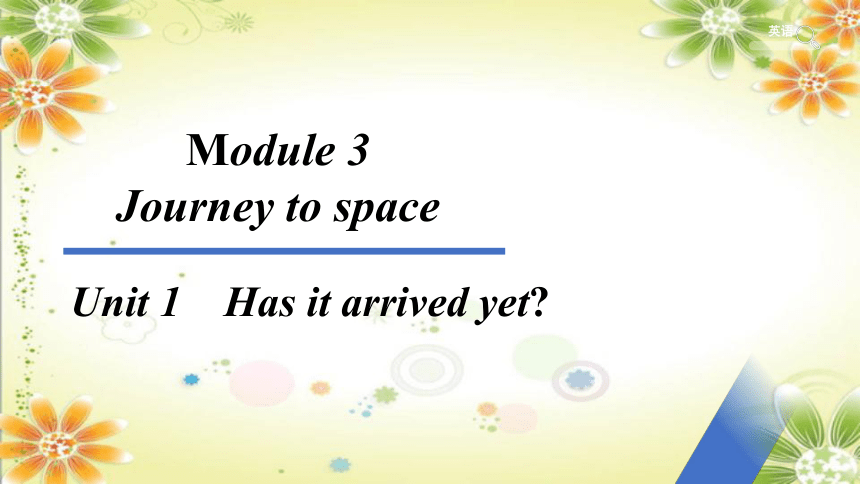
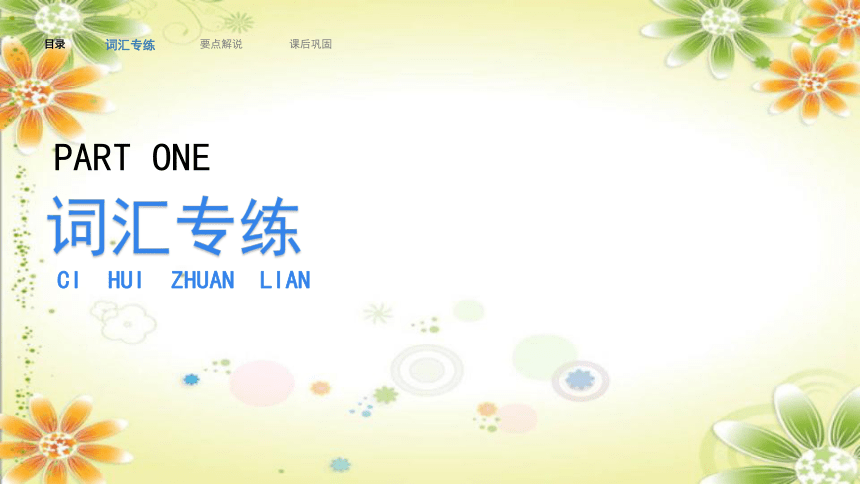
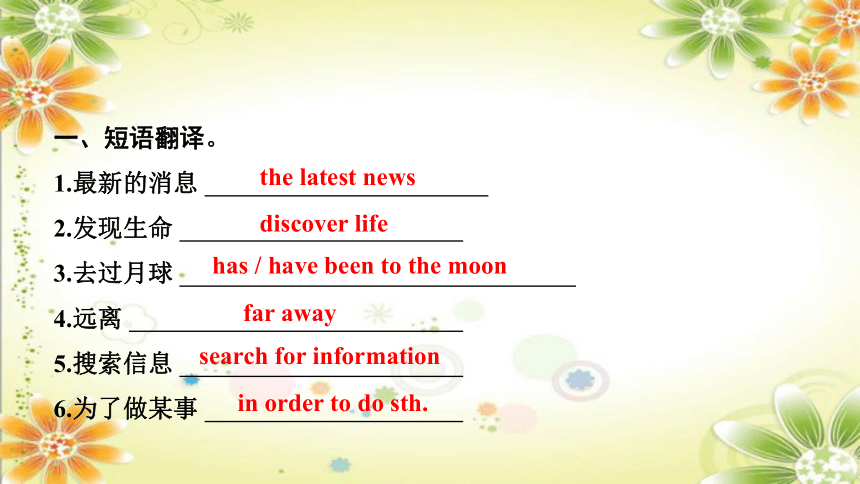
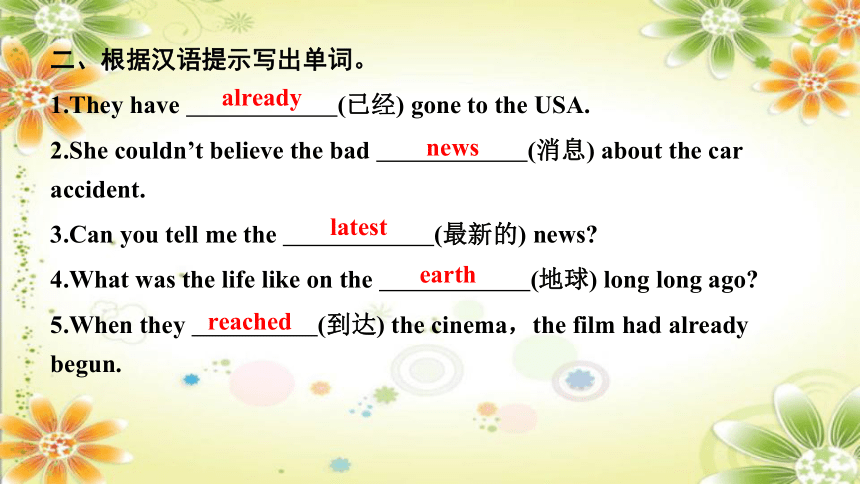
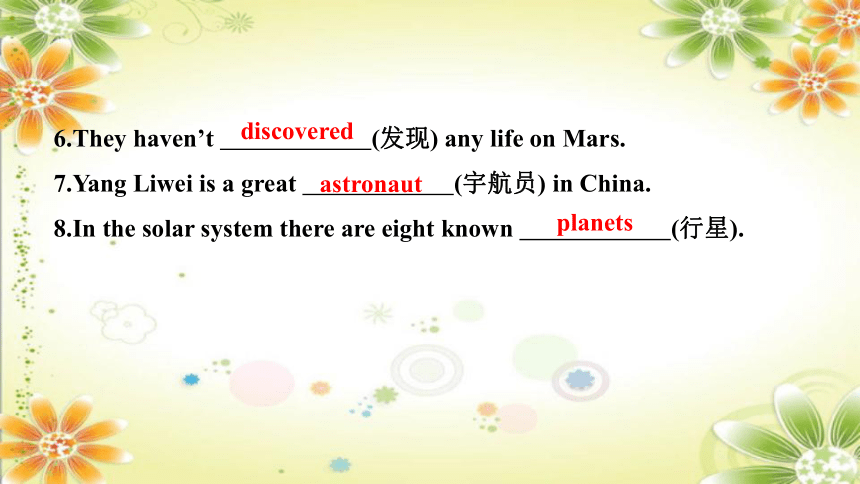
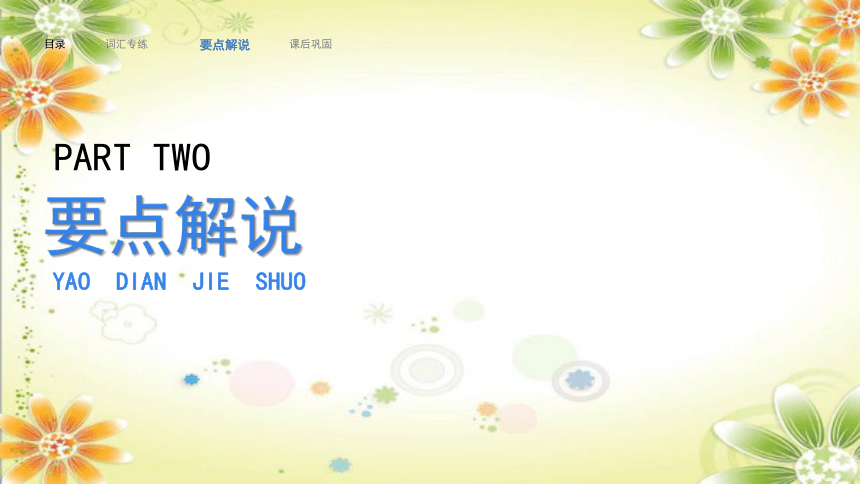
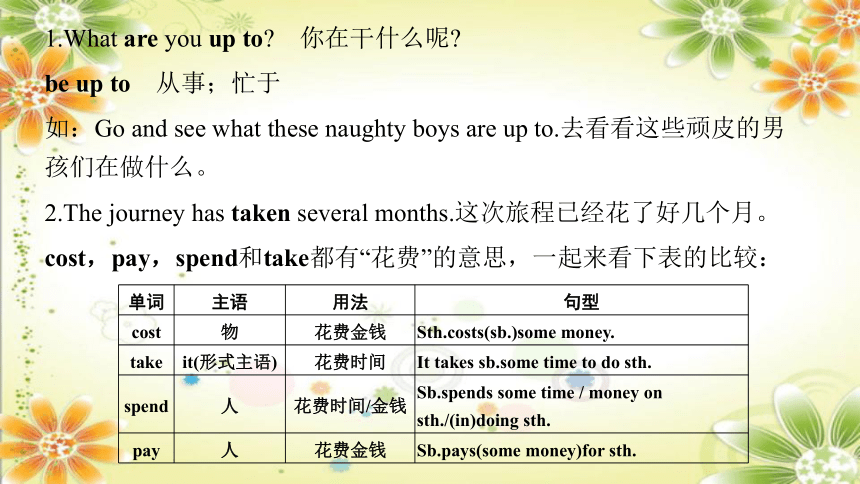
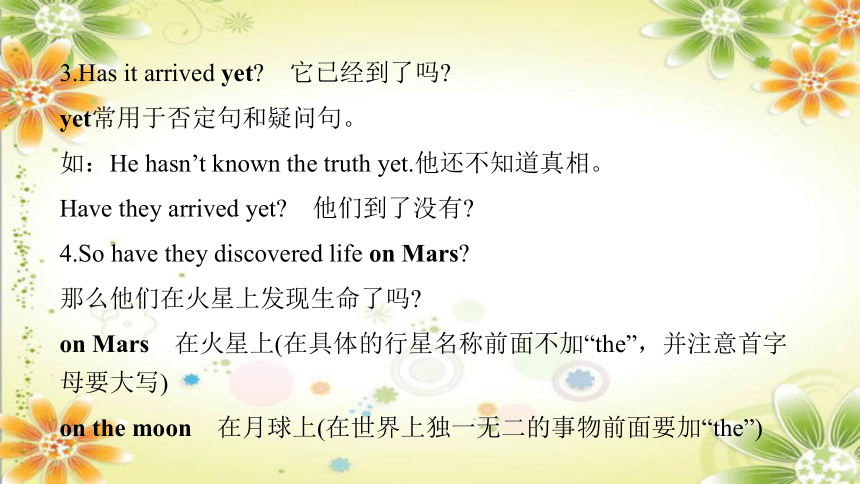
文档简介
(共22张PPT)
外研版八年级英语下册课件
英语
Module 3
Journey to space
Unit 1 Has it arrived yet
词汇专练
CI HUI ZHUAN LIAN
PART ONE
目录
词汇专练
要点解说
课后巩固
一、短语翻译。
1.最新的消息
2.发现生命
3.去过月球
4.远离
5.搜索信息
6.为了做某事
the latest news
discover life
has / have been to the moon
far away
search for information
in order to do sth.
二、根据汉语提示写出单词。
1.They have (已经) gone to the USA.
2.She couldn’t believe the bad (消息) about the car accident.
3.Can you tell me the (最新的) news
4.What was the life like on the (地球) long long ago
5.When they (到达) the cinema,the film had already begun.
already
news
latest
earth
reached
6.They haven’t (发现) any life on Mars.
7.Yang Liwei is a great (宇航员) in China.
8.In the solar system there are eight known (行星).
discovered
astronaut
planets
要点解说
YAO DIAN JIE SHUO
PART TWO
目录
词汇专练
要点解说
课后巩固
1.What are you up to 你在干什么呢
be up to 从事;忙于
如:Go and see what these naughty boys are up to.去看看这些顽皮的男孩们在做什么。
2.The journey has taken several months.这次旅程已经花了好几个月。
cost,pay,spend和take都有“花费”的意思,一起来看下表的比较:
单词 主语 用法 句型
cost 物 花费金钱 Sth.costs(sb.)some money.
take it(形式主语) 花费时间 It takes sb.some time to do sth.
spend 人 花费时间/金钱 Sb.spends some time / money on sth./(in)doing sth.
pay 人 花费金钱 Sb.pays(some money)for sth.
3.Has it arrived yet 它已经到了吗
yet常用于否定句和疑问句。
如:He hasn’t known the truth yet.他还不知道真相。
Have they arrived yet 他们到了没有
4.So have they discovered life on Mars
那么他们在火星上发现生命了吗
on Mars 在火星上(在具体的行星名称前面不加“the”,并注意首字母要大写)
on the moon 在月球上(在世界上独一无二的事物前面要加“the”)
5.Astronauts have already been to the moon.
宇航员已经去过月球了。
have been to … 去过某地(已经回来了)
have gone to … 去了某地(还没回来)
如:Sorry,they are not in Foshan now.They’ve gone to Shanghai.很抱歉,他们现在不在佛山。他们到上海去了。(还没回来)
We have been to the USA twice.
我们去过美国两次了。(已经回来了)
6.Yes,but no one has been to Mars yet,because Mars is very far away,much farther than the moon.是的,但是还没有人去过火星,因为火星(离地球)很远,比月球(到地球的距离)要远得多。
far away有“远离”的意思,但若away前面有具体表示距离的词,如“ten kilometres away”时,far要省略。
如:My home is thirteen kilometres away from my school.我家离学校有13公里。
7.Lots of scientists are working hard in order to send astronauts to Mars one day.
许多科学家正努力工作,为的是有一天能够把宇航员送上火星。
in order to意为“为了”,后面接动词原形;in order that也表示“为了”,但后面接从句。
如:We started early in order to arrive before noon.
=We started early in order that we could arrive before noon.
为了在中午前到达,我们很早就动身了。
课后巩固
KE HOU GONG GU
PART THREE
目录
词汇专练
要点解说
课后巩固
( )1.— What are you up ,Mike
— I’ve just finished reading a book on space travel.
A.to B.with C.for D.in
( )2.The stars are very far away from us.That is they look so small.
A.what B.when C.why D.where
一、单项选择。
A
C
( )3.— Li Lei isn’t in the classroom.Where is he
— He to the teachers’ office.
A.is going B.has gone C.has been D.will go
( )4.— Have you the news
— Yes,we will have a party on the weekend.
A.listened B.heard C.sung D.cleaned
B
B
( )5.— Lily has packed her things well.What about you
— Sorry,I haven’t packed my things .
A.already;already B.yet;already
C.yet;yet D.already;yet
D
1.你听到最新的消息了吗
Have you
2.我经常用电脑在网上查找信息。
I often use the computer to on the Internet.
3.他们已去过英国两次了。
They England twice.
二、完成句子,每空一词。
heard the latest news
search for information
have been to
4.这项工程已经耗时好几年了。
The project .
5.我家离玛丽家很远。
My home Mary’s.
has taken several years
is very far away from
Man has invented many kinds of satellites.Here are four of them.
The first kind of satellite studies the 1 of the earth.They are used to make maps.They also help countries to see where they may find oil or gold.
The second kind of satellite is used to guide ships and planes.A ship or a plane can 2 a message to the satellite,and the satellite can 3 where the ship or the plane is.
三、完形填空。
The third kind studies the 4 .These satellites 5 clouds and strong winds moving across the earth.They warn countries to make preparations (准备工作) when very 6 weather is coming.
The 7 kind is used for communication.Telephone calls among countries can be sent by these satellites.Some can 8 hundreds of calls at the same time.The call is sent to the satellite.Then the 9 sends it to a station in the country and this country is being phoned.These satellites 10 carry pictures and TV programmes.
They can receive and send several programmes at a time.
( )1.A.biology B.history C.physics D.geography
( )2.A.write B.send C.take D.bring
( )3.A.find out B.come out C.go out D.look out
( )4.A.food B.drink C.weather D.colour
( )5.A.search B.watch C.notice D.see
( )6.A.good B.bad C.light D.dark
( )7.A.later B.fast C.last D.best
( )8.A.carry B.give C.answer D.take
( )9.A.television B.telegraph C.spaceship D.satellite
( )10.A.too B.also C.either D.neither
D
B
A
C
B
B
C
A
D
B
谢谢观看
外研版八年级英语下册课件
英语
Module 3
Journey to space
Unit 1 Has it arrived yet
词汇专练
CI HUI ZHUAN LIAN
PART ONE
目录
词汇专练
要点解说
课后巩固
一、短语翻译。
1.最新的消息
2.发现生命
3.去过月球
4.远离
5.搜索信息
6.为了做某事
the latest news
discover life
has / have been to the moon
far away
search for information
in order to do sth.
二、根据汉语提示写出单词。
1.They have (已经) gone to the USA.
2.She couldn’t believe the bad (消息) about the car accident.
3.Can you tell me the (最新的) news
4.What was the life like on the (地球) long long ago
5.When they (到达) the cinema,the film had already begun.
already
news
latest
earth
reached
6.They haven’t (发现) any life on Mars.
7.Yang Liwei is a great (宇航员) in China.
8.In the solar system there are eight known (行星).
discovered
astronaut
planets
要点解说
YAO DIAN JIE SHUO
PART TWO
目录
词汇专练
要点解说
课后巩固
1.What are you up to 你在干什么呢
be up to 从事;忙于
如:Go and see what these naughty boys are up to.去看看这些顽皮的男孩们在做什么。
2.The journey has taken several months.这次旅程已经花了好几个月。
cost,pay,spend和take都有“花费”的意思,一起来看下表的比较:
单词 主语 用法 句型
cost 物 花费金钱 Sth.costs(sb.)some money.
take it(形式主语) 花费时间 It takes sb.some time to do sth.
spend 人 花费时间/金钱 Sb.spends some time / money on sth./(in)doing sth.
pay 人 花费金钱 Sb.pays(some money)for sth.
3.Has it arrived yet 它已经到了吗
yet常用于否定句和疑问句。
如:He hasn’t known the truth yet.他还不知道真相。
Have they arrived yet 他们到了没有
4.So have they discovered life on Mars
那么他们在火星上发现生命了吗
on Mars 在火星上(在具体的行星名称前面不加“the”,并注意首字母要大写)
on the moon 在月球上(在世界上独一无二的事物前面要加“the”)
5.Astronauts have already been to the moon.
宇航员已经去过月球了。
have been to … 去过某地(已经回来了)
have gone to … 去了某地(还没回来)
如:Sorry,they are not in Foshan now.They’ve gone to Shanghai.很抱歉,他们现在不在佛山。他们到上海去了。(还没回来)
We have been to the USA twice.
我们去过美国两次了。(已经回来了)
6.Yes,but no one has been to Mars yet,because Mars is very far away,much farther than the moon.是的,但是还没有人去过火星,因为火星(离地球)很远,比月球(到地球的距离)要远得多。
far away有“远离”的意思,但若away前面有具体表示距离的词,如“ten kilometres away”时,far要省略。
如:My home is thirteen kilometres away from my school.我家离学校有13公里。
7.Lots of scientists are working hard in order to send astronauts to Mars one day.
许多科学家正努力工作,为的是有一天能够把宇航员送上火星。
in order to意为“为了”,后面接动词原形;in order that也表示“为了”,但后面接从句。
如:We started early in order to arrive before noon.
=We started early in order that we could arrive before noon.
为了在中午前到达,我们很早就动身了。
课后巩固
KE HOU GONG GU
PART THREE
目录
词汇专练
要点解说
课后巩固
( )1.— What are you up ,Mike
— I’ve just finished reading a book on space travel.
A.to B.with C.for D.in
( )2.The stars are very far away from us.That is they look so small.
A.what B.when C.why D.where
一、单项选择。
A
C
( )3.— Li Lei isn’t in the classroom.Where is he
— He to the teachers’ office.
A.is going B.has gone C.has been D.will go
( )4.— Have you the news
— Yes,we will have a party on the weekend.
A.listened B.heard C.sung D.cleaned
B
B
( )5.— Lily has packed her things well.What about you
— Sorry,I haven’t packed my things .
A.already;already B.yet;already
C.yet;yet D.already;yet
D
1.你听到最新的消息了吗
Have you
2.我经常用电脑在网上查找信息。
I often use the computer to on the Internet.
3.他们已去过英国两次了。
They England twice.
二、完成句子,每空一词。
heard the latest news
search for information
have been to
4.这项工程已经耗时好几年了。
The project .
5.我家离玛丽家很远。
My home Mary’s.
has taken several years
is very far away from
Man has invented many kinds of satellites.Here are four of them.
The first kind of satellite studies the 1 of the earth.They are used to make maps.They also help countries to see where they may find oil or gold.
The second kind of satellite is used to guide ships and planes.A ship or a plane can 2 a message to the satellite,and the satellite can 3 where the ship or the plane is.
三、完形填空。
The third kind studies the 4 .These satellites 5 clouds and strong winds moving across the earth.They warn countries to make preparations (准备工作) when very 6 weather is coming.
The 7 kind is used for communication.Telephone calls among countries can be sent by these satellites.Some can 8 hundreds of calls at the same time.The call is sent to the satellite.Then the 9 sends it to a station in the country and this country is being phoned.These satellites 10 carry pictures and TV programmes.
They can receive and send several programmes at a time.
( )1.A.biology B.history C.physics D.geography
( )2.A.write B.send C.take D.bring
( )3.A.find out B.come out C.go out D.look out
( )4.A.food B.drink C.weather D.colour
( )5.A.search B.watch C.notice D.see
( )6.A.good B.bad C.light D.dark
( )7.A.later B.fast C.last D.best
( )8.A.carry B.give C.answer D.take
( )9.A.television B.telegraph C.spaceship D.satellite
( )10.A.too B.also C.either D.neither
D
B
A
C
B
B
C
A
D
B
谢谢观看
同课章节目录
- Module 1 Feelings and impressions
- Unit 1 It smells delicious.
- Unit 2 I feel nervous when I speak Chinese .
- Unit 3 Language in use
- Module 2 Experiences
- Unit 1 I've also entered lots of speaking competi
- Unit 2 They have seen the Pyramids.
- Unit 3 Language in use
- Module 3 Journey to space
- Unit 1 Has it arrived yet?
- Unit 2 We have not found life on any other planet
- Unit 3 Language in use
- Module 4 Seeing the docto
- Unit 1 I haven't done much exercise since I got m
- Unit 2 We have played football for a year now
- Unit 3 Language in use
- Module 5 Cartoons
- Unit 1 It's time to watch a cartoon.
- Unit 2 Tintin has been popular for over eighty yea
- Unit 3 Language in use
- Revision module A
- Module 6 Hobbies
- Unit 1 Do you collect anything ?
- Unit 2 Hobbies can make you grow as a person.
- Unit 3 Language in use
- Module 7 Summer in Los Angeles
- Unit 1 Please write to me and send me some photos
- Unit 2 Fill out a form and come to learn English
- Unit 3 Language in use
- Module 8 Time off
- Unit 1 I can hardly believe we are in the city ce
- Unit 2 We thought somebody was moving about
- Unit 3 Language in use
- Module 9 Friendship
- Unit 1 Could I ask if you've mentioned this to he
- Unit 2 I believe that the world is what you think
- Unit 3 Language in use
- Module 10 On the radio
- Unit 1 I hope that you can join us one day
- Unit 2 It seemed that they were speaking to me in
- Unit 3 Language in use
- Revision module B
